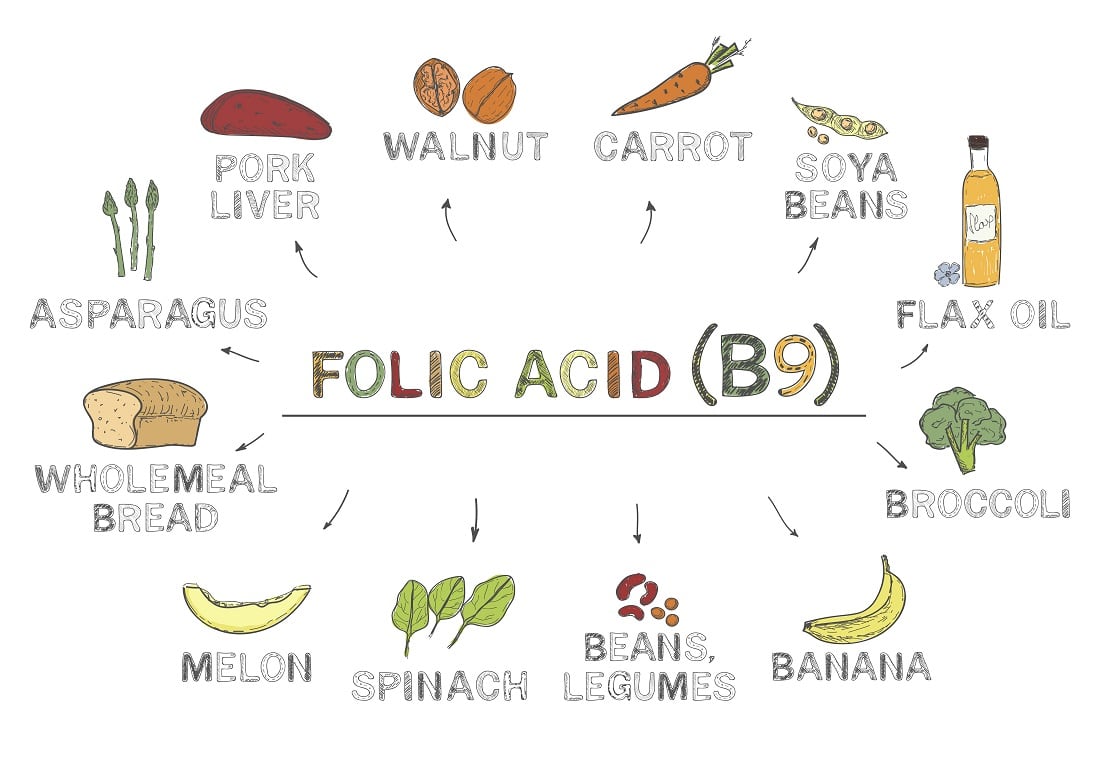Similar policies already exist in around 80 countries worldwide. Folic acid is the man-made form of the vitamin, folate. This vitamin is important for cell division in general and, with vitamin B12, the production of healthy red blood cells. Deficiency results in a type of anaemia. It is found naturally in some foods such as leafy green veg and is currently added voluntarily to others such as breakfast cereals. A healthy diet can usually deliver sufficient but a higher intake is required during the first 12 weeks of pregnancy when the baby’s neural tube, which becomes the spine and brain, is forming.
Folate intake and blood folate levels (‘status’) have both worsened over the past decade, with the proportion of women of childbearing age with a red blood cell folate concentration below the threshold signalling an increased risk that a pregnancy may be affected by a neural tube defect (NTD) increasing from around two-thirds to almost 90%. Furthermore, status has worsened across the population in general, including adolescents (average intake in adolescent girls is now below the reference level known as the RNI).
Folic acid supplements during early pregnancy help reduce life-threatening NTDs in the baby, such as spina bifida. Women of childbearing age are advised to routinely take a daily 400µg supplement because around half of pregnancies are unplanned and the vitamin is needed in the very early stages of pregnancy. But uptake is low, especially in those on low income (consumed by only 10% of women in the most deprived decile compared to 26% in least deprived) and in those under age 20.
A long journey
In 2000, 2006 and 2009, Government scientific advisers reviewed the available evidence, including potential adverse effects for some groups, and each time recommended mandatory fortification of flour with this vitamin. Action was not taken.
In 2015, Government advisers wrote to UK health ministers, stressing the safety of folic acid fortification in other countries, associated improvements in folate status and falls in NTDs (for example, by 28% in the US). They emphasised that folate status of UK women of reproductive age had fallen in the interim, possibly linked to less voluntary fortification in anticipation of mandatory provision.
In response to a request from Food Standards Scotland in 2016, Government advisers were asked to look at the new evidence since 2009 and, in 2017, reported finding nothing substantive to justify a change to their original advice or to the upper limit of 1mg/day. A public consultation subsequently took place in 2019, leading to the announcement on 20 September 2021.
More details awaited
The Government’s announcement lacks detail about the folic acid concentration to be added, its position on additional voluntary fortification to support those who don’t consume non-wholemeal wheat flour (for example, those who choose wholemeal or gluten-free flours) or on measures to limit risk of excessive consumption from combinations of food and supplements.
From a practical perspective, the decision to focus on non-wholemeal wheat flour makes sense as this is already fortified by law with calcium, iron and some B vitamins. But there is a risk that this might drive purchases away from wholemeal products with their higher fibre content, exacerbating the problem that already exists with fibre intakes being more than a third below recommendations. Hopefully, a Government-led information campaign will accompany implementation.
It is helpful that the new rules will extend beyond bread flour as an estimated 29% of women consume very small quantities and bread consumption has been falling for some time. But it is not yet clear whether the decision is just for UK milled wheat for consumption in the UK or whether it will extend to imported non-wholemeal wheat flours.
Judy Buttriss is the director general of the British Nutrition Foundation.




